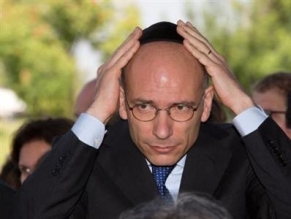|
World Jewish News

Italian Prime Minister Enrico Letta on Monday visited the Holocaust Memorial at Yad Vashem in Jerusalem.
|
Italian Prime Minister Letta’s first visit to Israel
02.07.2013, Israel Israeli Premier Benjamin Netanyahu sought to highlight Israel’s “common foundations” with close ally Italy on his Italian counterpart Enrico Letta’s first visit to the Jewish State Monday, as he described Italian heritage as “a great inspiration for the rebirth of the modern Jewish state”.
Hailing the allies’ extensive bilateral cooperation across the fields of trade, science, technology and medicine, he focused his hopes for a heightened partnership on the US-motivated revived Mideast peace process, as he insisted Secretary of State John Kerry’s recent efforts “deserve consistent and constant European support, and I’m sure that Italy will give that support”.
Italy was a surprise supporter of the Palestinian Authority’s appeal for non member observer status at last November’s UN General Assembly, as the foreign ministry insisted the shock decision formed “an integral part of the Italian government’s aim to revive the peace process with the goal of two states, Israel and Palestine, that can live side by side in peace, security and mutual recognition”.
A move by Letta’s predecessor Mario Monti, whom Letta replaced following April’s national elections, the former PM claimed to have contacted both Netanyahu and “moderate leader” (PA President) Abbas in advance of the vote to express Italy’s position, adding that it was a strike “against violence and in favour of dialogue as the only way to a lasting solution to the conflict”.
Appearing to rule out a clause in the general assembly’s resolution that said the Security Council would “consider favourably” a Palestinian bid for full UN membership, which would constitute an effective unilateral declaration of statehood refused by the council last year, the Italian statement concede that whilst an encouragement for the Palestinians to choose a path “against extremism”, it was not in its view a move toward unilateral statehood, as full membership of the UN could only be achieved “through negotiation and direct agreement between the parties”.
In a visit by Israeli President Shimon Peres to Rome in the immediate aftermath of Letta’s election victory in May, both leaders sought to consolidate their historic close relations, as Letta told media of his plans to focus on “the importance of continuing and strengthening the excellent relations between Italy and Israel”. A perceived right-wing presence in his centre-left Democratic Party, Letta is regarded as being a friend of Israel, despite his record of being critical of Israeli settlement activity emulating the EU’s repeated condemnations of expansion plans by the Jewish State.
Responding to Netanyahu’s overtures, Letta said the choice of Jerusalem as his first tour outside of Europe was “a very important signal”, as he commended the Israeli PM’s commitment to the peace process, and expressed hopes of Europe providing “a big support to your peace process”. Success in this respect, he added, would “be very important for global peace and prosperity”.
Netanyahu also used the opportunity of the visit to further lobby for support for Israel’s calls on the EU to designate Lebanese Hezbollah a terrorist organisation, in response to Bulgarian authorities’ conclusions the group was behind a deadly attack on Israeli tourists in Burgas last July. Decrying the militant group, which has taken an increasingly active role in Syrian hostilities on the side of authoritarian leader Bashar al Assad, as “one of the preeminent terrorist organisations of our time”, he re-emphasised his rhetoric in his meeting with EU foreign policy chief Catherine Ashton in Jerusalem last month, when he said that “if Hezbollah isn’t a terrorist organisation, I don’t know what is”.
Acknowledging Israel’s concerns, as the US have similarly called for action to outlaw the group in line with fellow allies the Netherlands and Britain (which only designates its militant wing a terrorist entity), Letta insisted he was “optimistic for the future”, he committed to raising the issue at European level in an attempt to reach a consensus, which has so far proved elusive.
During his visit, the Italian Prime Minister participated Monday in an official ceremony at Yad Vashem Holocaust Memorial Museum where he signed the visitors book.
In his message, Letta described the Shoah as an “open wound that pierces the land of Jerusalem and the soul of the Jewish people”.
Educating the next generation is a collective “duty” for mankind, he maintained, as he decried “indifference” to the atrocities and insisted on the need to “bear testimony when there are no more survivors”.
In addition to Letta’s scheduled meeting and press conference with Netanyahu, he also met with President Peres before going on to an audience with members of the Italian community at the Temple of Jerusalem.
On Tuesday, he was due to meet with President Abbas in Ramallah before the two leaders deliver a joint press conference.
EJP
|
|
